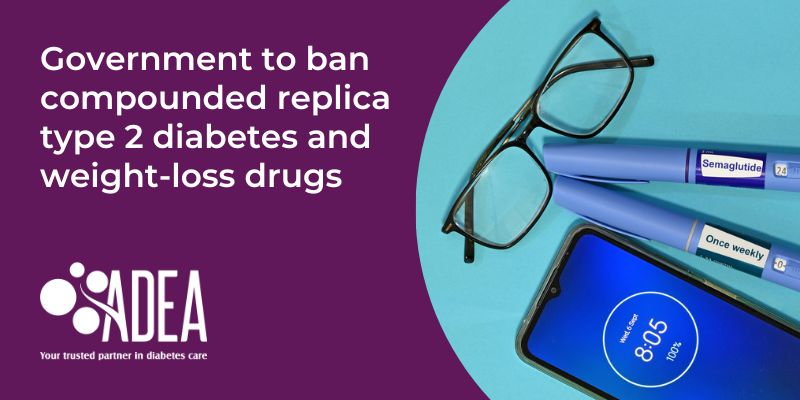Already a member? Click here to login.

Australian Diabetes Educators Association
Already a member? Click here to login.

Already a member? Click here to login.

ADEA welcomes today’s federal government announcement that compounded replica GLP-1 RA products, many of which claim to be replicas of Ozempic and Mounjaro, will be banned due to concerns about safety risks.
New regulations taking effect on 1 October 2024 will remove compounded semaglutide-containing products from the pharmacy compounding exemption.
The move comes as compounding pharmacies have produced their own replica products for people due to continuing shortages of Ozempic and Mounjaro, which are approved by the Therapeutic Goods Administration (TGA) to manage type 2 diabetes.
The government states that at least 20,000 Australians are injecting these compounded replica products and most of them are using them for weight-loss management.
The new regulations aim to protect people from potentially unsafe compounded replica products, with the government saying the change is consistent with advice from the TGA.
The change followed consultations with relevant stakeholders, and state and territory governments.
ADEA welcomed the move, with CEO Susan Davidson saying the new regulations will help ensure the safety risks associated with compounded replica products are minimised.
“However, we remain concerned about the availability of Ozempic and other TGA-approved diabetes medications and products and, along with our unified partners, the Australian Diabetes Society and Diabetes Australia, we continue to advocate for reliable access for people living with diabetes.”
Health Minister Mark Butler said that while compounding was valid in certain circumstances, the priority was to ensure safety for Australians.
“You only have to look to the recent reports of individuals impacted by large-scale compounding to realise the dangers posed,” he said.
“This action will protect Australians from harm and save lives.”
Mr Butler said today’s announcement would not affect compounded medicines other than GLP-1 receptors.
The TGA will work with key medical, pharmacy, and consumer stakeholders to support consumers and their practitioners in navigating the change and, where appropriate, help with guidance in finding alternative and safe medicines.
People are encouraged to consult with their healthcare team and prepare alternative management plans appropriately before the change takes effect in October.

ADEA welcomes today’s federal government announcement that compounded replica GLP-1 RA products, many of which claim to be replicas of Ozempic and Mounjaro, will be banned due to concerns about safety risks.
New regulations taking effect on 1 October 2024 will remove compounded semaglutide-containing products from the pharmacy compounding exemption.
The move comes as compounding pharmacies have produced their own replica products for people due to continuing shortages of Ozempic and Mounjaro, which are approved by the Therapeutic Goods Administration (TGA) to manage type 2 diabetes.
The government states that at least 20,000 Australians are injecting these compounded replica products and most of them are using them for weight-loss management.
The new regulations aim to protect people from potentially unsafe compounded replica products, with the government saying the change is consistent with advice from the TGA.
The change followed consultations with relevant stakeholders, and state and territory governments.
ADEA welcomed the move, with CEO Susan Davidson saying the new regulations will help ensure the safety risks associated with compounded replica products are minimised.
“However, we remain concerned about the availability of Ozempic and other TGA-approved diabetes medications and products and, along with our unified partners, the Australian Diabetes Society and Diabetes Australia, we continue to advocate for reliable access for people living with diabetes.”
Health Minister Mark Butler said that while compounding was valid in certain circumstances, the priority was to ensure safety for Australians.
“You only have to look to the recent reports of individuals impacted by large-scale compounding to realise the dangers posed,” he said.
“This action will protect Australians from harm and save lives.”
Mr Butler said today’s announcement would not affect compounded medicines other than GLP-1 receptors.
The TGA will work with key medical, pharmacy, and consumer stakeholders to support consumers and their practitioners in navigating the change and, where appropriate, help with guidance in finding alternative and safe medicines.
People are encouraged to consult with their healthcare team and prepare alternative management plans appropriately before the change takes effect in October.